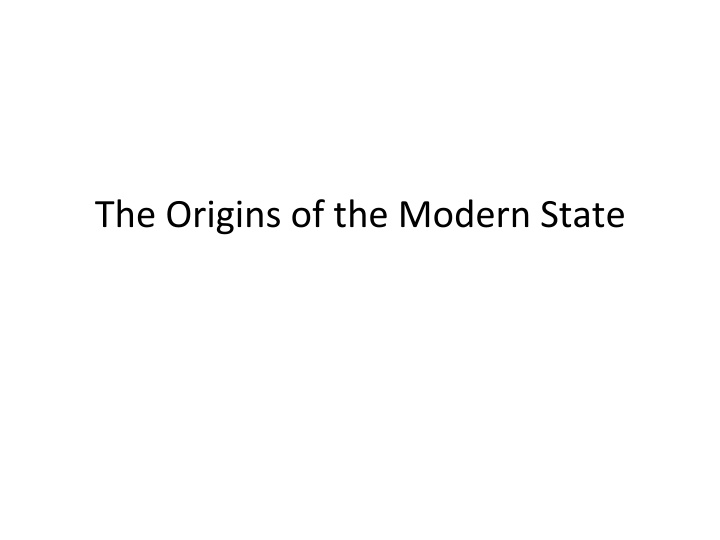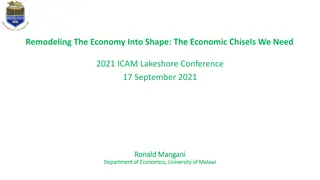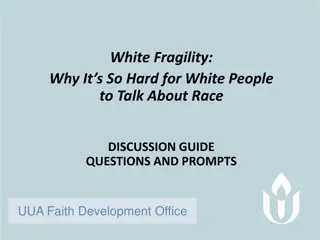Origins of the Modern State and State Fragility
Delve into the concept of the modern state, exploring its origins, the role of coercion and physical force in governance, the idea of nation-states, and the spectrum of state effectiveness. Understand the social contract view of the state, consider state fragility in 2023, and ponder the state of nature without a governing entity. Through images and quotes from influential thinkers like Max Weber and Samuel Huntington, grasp the complex nature of statehood and its implications in society.
Download Presentation

Please find below an Image/Link to download the presentation.
The content on the website is provided AS IS for your information and personal use only. It may not be sold, licensed, or shared on other websites without obtaining consent from the author.If you encounter any issues during the download, it is possible that the publisher has removed the file from their server.
You are allowed to download the files provided on this website for personal or commercial use, subject to the condition that they are used lawfully. All files are the property of their respective owners.
The content on the website is provided AS IS for your information and personal use only. It may not be sold, licensed, or shared on other websites without obtaining consent from the author.
E N D
Presentation Transcript
Max Weber: The state is a human community that (successfully) claims the monopoly of the legitimate use of physical force within a given territory.
A state is an entity that uses coercion and the threat of force to rule in a given territory.
A nation is a group of people who share some sort of common identity like a language, a religion, an ethnicity, or a shared history. A nation-state is a state in which a single nation predominates and the legal, social, demographic, and geographic boundaries of the state are connected in important ways to that nation.
A failed state is a state-like entity that cannot coerce and is unable to successfully control the inhabitants in a given territory.
In reality, there is a continuum of stateness or state effectiveness. Samuel Huntington: the most important political distinction among countries concerns not their form of government but their degree of government.
Early modern political thinkers engaged in thought experiments to think about the role of the state. What would life be like without a state?
The State of Nature The state of nature is the term used to describe situations in which there is no state.
Hobbes: The state of nature is a war of everyone against every man in which life is solitary, poor, nasty, brutish, and short.
Individuals in the state of nature face a dilemma. Everyone would be better off if they could all agree not to take advantage of each other. But if an act of violence or theft were to happen, it would be better to be the attacker than the victim.
Claim: Without a common power to keep them all in awe, the people will choose to steal and kill.
Social contract theorists argue that theres something structural about the state of nature that makes it difficult for citizens to behave themselves.
Game theory can shed light on the structural aspects of the state of nature that might lead to problems. A stylized interaction between two individuals who can steal or refrain from stealing.
A payoff table represents the strategies and payoffs available to players in a strategic or normal form game.
State of Nature Game without Payoffs B Refrain Steal Refrain A Steal
A preference ordering indicates how a player ranks the possible outcomes of a game. Individual A (Steal; Refrain) > (Refrain; Refrain) > (Steal; Steal) > (Refrain; Steal) Individual B (Refrain; Steal) > (Refrain; Refrain) > (Steal; Steal) > (Steal; Refrain)
Numbers ordinal payoffs can be assigned to represent the preference orderings. Given four possible outcomes, one could use 4, 3, 2, and 1. Ordinal payoffs allow us to know how a player ranks the possible outcomes.
Individual A (Steal; Refrain) > (Refrain; Refrain) > (Steal; Steal) > (Refrain; Steal) 4 3 2 1 Individual B (Refrain; Steal) > (Refrain; Refrain) > (Steal; Steal) > (Steal; Refrain) 4 3 2 1
State of Nature Game with Payoffs B Refrain Steal Refrain 3,3 1,4 A 4,1 2,2 Steal
Solving the State of Nature Game What would a rational decision maker do?
Solving the State of Nature Game What would a rational decision maker do? A strategy specifies the choices that are made by a player at every point in a game where that player has a choice to make. A Nash equilibrium is a combination of strategies, one for each player, such that each player in the game doesn t want to unilaterally change their strategy given the strategy adopted by the other player.
We can find Nash equilibria by looking for each players best replies. A player s best replies indicate the choices that are best for each of the possible choices the other player might make. If both players are doing the best they can given the strategy adopted by the other player, then neither player wants to unilaterally change their strategy we have a Nash equilibrium.
Put yourself in the shoes of individual A. 1. What is your best reply if individual B chooses to refrain? 2. What is your best reply if individual B chooses to steal?
Solving the State of Nature Game I B Refrain Steal 3,3 1,4 Refrain A 4,1 2,2 Steal Steal is the best reply if individual B refrains.
Solving the State of Nature Game II B Refrain Steal 3,3 1,4 Refrain A 4,1 2,2 Steal Steal is the best reply if individual B steals.
Now put yourself in the shoes of individual B. 1. What is your best reply if individual A chooses to refrain? 2. What is your best reply if individual A chooses to steal?
Solving the State of Nature Game III B Refrain Steal 3,3 1,4 Refrain A 4,1 2,2 Steal Steal is the best reply if individual A refrains.
Solving the State of Nature Game IV B Refrain Steal 3,3 1,4 Refrain A 4,1 2, 2 Steal Steal is the best reply if individual A steals.
State of Nature Game B Refrain Steal 3,3 1,4 Refrain A 4,1 2, 2 Steal The Nash equilibrium is where both players are playing best replies.
State of Nature Game B Refrain Steal 3,3 1,4 Refrain A 4,1 2, 2 Steal Nash equilibrium: (Steal; Steal) Observed outcome: Both individuals steal. Payoffs: Individual A obtains 2 and individual B obtains 2.
Visualizing the Method for Solving the Game B Refrain Steal Refrain 3, 3 1, 4 A 4, 1 2, 2 Steal
A player has a dominant strategy if that strategy is a best reply to all of the other player s strategies. A dominant-strategy Nash equilibrium occurs when both players have a dominant strategy.
A player has a dominant strategy if that strategy is a best reply to all of the other player s strategies. A dominant-strategy Nash equilibrium occurs when both players have a dominant strategy. Is the Nash equilibrium (Steal; Steal) a dominant-strategy Nash equilibrium?
State of Nature Game B Refrain Steal 3,3 1,4 Refrain A 4,1 2, 2 Steal Both players have a dominant strategy to steal. (Steal; Steal) is a dominant-strategy Nash equilibrium.
Individuals will live in a persistent state of fear when theres nobody to keep them in a state of awe. The state of nature may seem abstract but . . . Yemen, Syria, Sudan, regions of Mexico affected by cartel violence, New Orleans after Hurricane Katrina.
Nobel Laureate Robert Fogle argues that Hobbes state of nature describes most of human history. Humans have spent almost their entire evolutionary history in small bands of hunter-gatherers where looting and violent death were about as commonplace as the Hobbesian state of nature would suggest they d be.
State of Nature Game B Refrain Steal 3,3 1,4 Refrain A 4,1 2, 2 Steal What s weird about the Nash equilibrium?
State of Nature Game B Refrain Steal 3,3 1,4 Refrain A 4,1 2, 2 Steal Both players could do better if they refrained!
Individual rationality leads to an outcome thats inferior in the sense that both players agree that some alternative outcome is better. It s not enough for the actors to recognize their mutually destructive behavior. How comforted would you feel if the other individual promised, perhaps in a contract, not to steal from you?
Civil Society and the Social Contract Hobbes solution to the state of nature was to create a sovereign a form of centralized authority with sufficient force that people would stand in awe. Individuals should transfer power to the sovereign in exchange for protection.
Individuals would give up their natural rights in return for civil rights. Natural rights are universal and exist in the state of nature. Civil rights don t exist in the state of nature but are instead created by states through laws.
This exchange would be achieved with the help of a social contract. A social contract is an implicit agreement among individuals in the state of nature to create and empower the state. In doing so, it outlines the rights and responsibilities of the state and the citizens in regard to each other. Social contract theorists have differed over the extent to which individuals should delegate authority to the state.
Social contract theorists view the state as a third-party enforcer that can dole out punishments to individuals who engage in socially destructive behavior that violates the social contract. These punishments would be structured in such a way that steal is no longer a dominant strategy for individuals in society. But how does this work?
Civil Society Game B Refrain Steal 3,3 1,4 p Refrain A 4 p, 1 2 p, 2 p Steal Cardinal payoffs allow us to know how much more the players prefer one outcome to another.
Civil Society Game B Refrain Steal 3,3 1,4 p Refrain A 4 p, 1 2 p, 2 p Steal How big does the punishment need to be for the individual to prefer refraining?
Civil Society Game when p > 1 B Refrain Steal 3, 3 1,4 p Refrain A 4 p, 1 2 p, 2 p Steal Nash equilibrium: (Refrain; Refrain) Observed outcome: Both individuals refrain. Payoffs: Individual A obtains 3 and individual B obtains 3.























